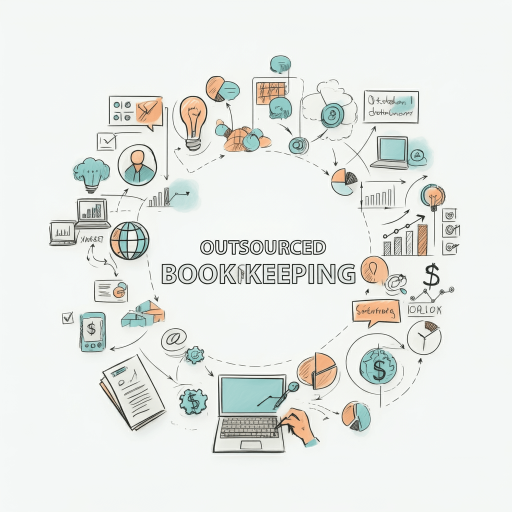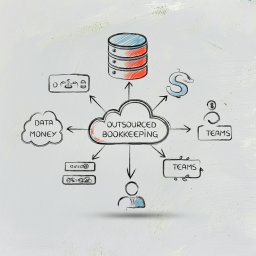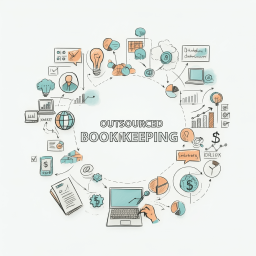Physical Address
304 North Cardinal St.
Dorchester Center, MA 02124
Physical Address
304 North Cardinal St.
Dorchester Center, MA 02124

In today’s fast-paced business world, managing your books effectively can make or break your small business. For many entrepreneurs, outsourced bookkeeping offers an efficient, cost-effective solution. By leveraging professional services without the commitment of a full-time employee, you can keep your finances in order and focus on growing your business.
Perhaps you have read our previous article about bookkeeping for small businesses and hiring a bookkeeper. If not, we recommend that you read those pages first. Let’s repeat the three options you have managing your business’ bookkeeping function:
If you’ve already read it and decided that how to do bookkeeping is not for you, then please go ahead and learn about outsourced bookkeeping!
This guide will explore the benefits, considerations, and steps for outsourcing your bookkeeping, as well as how to choose the right provider for your unique needs.

Outsourced bookkeeping is the process of hiring a third-party service provider to manage your financial records, handle reconciliations, and provide reporting insights. This arrangement eliminates the need to employ an in-house bookkeeper, saving on overhead costs like salaries, benefits, and training.
Services typically offered by outsourced bookkeepers include:

Hiring an in-house bookkeeper can be expensive, especially when you factor in wages, employer taxes, and employee benefits. Outsourced bookkeeping services are typically priced as flat monthly fees or hourly rates, allowing for better cost predictability.
Outsourced providers specialize in bookkeeping and stay updated on industry trends and compliance regulations. This ensures your records are accurate and that you remain in good standing with tax authorities.
Managing your books can consume valuable hours that could be spent on revenue-generating activities. By outsourcing, you free up time to focus on your core business operations.
Outsourced bookkeeping services are flexible, allowing you to scale up or down depending on your business’s needs.
Many providers use sophisticated accounting software and tools that would be costly for small businesses to invest in independently.

Before outsourcing, identify what services you require. Do you need help with day-to-day bookkeeping, payroll, or financial reporting?
Verify the qualifications and certifications of potential providers. A reputable bookkeeper should be knowledgeable in software like QuickBooks, Xero, or FreshBooks and understand local tax regulations.
Choose a provider who is responsive and communicates effectively. Regular updates and accessible support are essential for peace of mind.
Understand the provider’s pricing structure and what is included in their fees. Avoid long-term contracts unless you’re confident in their service quality.
Ensure the provider has robust data security measures in place to protect sensitive financial information.

Take stock of your existing bookkeeping process and identify areas for improvement.
Before transitioning, ensure your financial records are well-organized. This minimizes onboarding challenges.
Discuss your needs and goals with the provider. Clearly outline deliverables, timelines, and communication preferences.
Regularly review reports and performance metrics to ensure the outsourced service is meeting your expectations.
Outsourced bookkeeping is ideal for small businesses that:
However, it may not be the best fit for businesses that prefer in-house control over financial operations or have highly specific needs that require close collaboration.
While both services involve managing financial records, a full charge bookkeeper typically works in-house and handles a broader range of tasks, such as overseeing accounts payable/receivable and preparing financial statements.
Q: What is the cost of outsourced bookkeeping services?
A: Costs vary depending on the provider and the level of service required. Small businesses can expect to pay anywhere from $200 to $2,500 per month.
Q: Can I outsource bookkeeping and still use my preferred software?
A: Yes, many providers work with popular platforms like QuickBooks, Xero, or Wave.
Q: Are outsourced bookkeeping services secure?
A: Reputable providers implement strong data encryption and compliance measures to ensure the security of your financial data.
Q: How do I find the best outsourced bookkeeping service?
A: Start by researching providers with strong reviews, transparent pricing, and relevant experience in your industry.
Outsourced bookkeeping offers small businesses a practical way to maintain accurate financial records without the costs and complexities of hiring in-house staff. By choosing the right provider, you can gain peace of mind, free up time, and focus on growing your business.
Suggested Tier 4 Pages to Link to:
Outsourced Bookkeeping Services: Finding the Right Fit
Full Charge Bookkeeper: A Detailed Job Description
Costs vary depending on the provider and the level of service required. It also depends on geographical area and local cost of living metrics. Small businesses can expect to pay anywhere from $200 to $2,500 per month for basic bookkeeping: Expense categorization, account reconciliations and basic financial statements (profit and loss statement and balance sheet).
Yes, many providers work with popular platforms like QuickBooks, Xero, or Wave.
Reputable providers implement strong data encryption and compliance measures to ensure the security of your financial data.
Start by researching providers with strong reviews, transparent pricing, and relevant experience in your industry.
If you’ve tried to find a good article on the search engines, you already know that most of the search results are either sponsored results or so littered with advertising banners that they’re hard to read.
For an in-depth exploration of outsourced bookkeeping, including its benefits and challenges, you can check out SCORE’s article: “Pros and Cons of Outsourcing: What You Need to Know.” This well-researched piece outlines how outsourcing bookkeeping can save costs, provide access to expertise, and free up time, while also addressing potential concerns like quality control and communication. It’s a great starting point for small business owners considering this option!